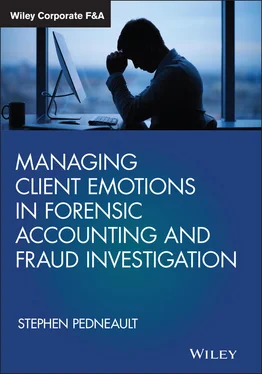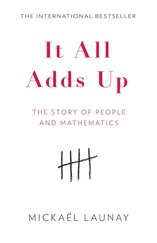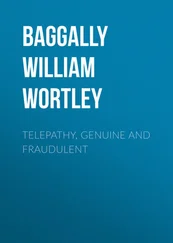When he heard that, his face relaxed a bit, and he said that the check payments and credit‐card charges were for personal and family expenses rather than school‐related expenditures. We asked him to provide some detail about these expenses and spent the next hour or so going month by month through the bank statements, having him identify the personal expenses he'd paid with the school's sports funds. He also detailed how not all of the sports fees collected had been deposited, because he and his family had needed the funds at times to pay their mortgage or other expenses. Then he took us through the monthly credit‐card statements, which revealed that the credit‐card activity had nothing to do with the sports programs.
After reviewing all of the records, we thanked him for meeting with us. We told him he could have gone another way, by discarding all the records and declining to speak with us, but by being forthcoming, at least it was now all out on the table and we could work with the school, counsel, and him to resolve the issue of his misuse of school's funds. He looked much less stressed and nervous as we ended the meeting.
At the outset of this matter, we'd had no idea there was a problem with the school's sports funds. We knew there had been an issue with the finance manager and with tuition and fees not being receipted and deposited into the school's bank accounts. However, we had no idea there was a completely separate issue with the sports program's finances. By listening respectfully to the administrative employee's story – and then treating the coach the same way – we were able to uncover a completely separate problem that was easier to quantify than the original issue.
During a fraud engagement, individuals may become frustrated, angry, or depressed. They may break down and start crying during parts of their story and then turn angry during others. It is prudent to prepare for mood changes and expect a rollercoaster ride of emotions. Throughout it all, actively listen to clients and allow them time to regain their composure as needed. The impact of being a victim of fraud, or being accused of fraud, is very personal and the individual will likely be under a significant amount of stress. Their emotional state may be very unstable, and they may feel violated, especially if trusted family members or friends are involved in the matter, which is often the case.
It is important to note that while I discuss the victim's perspective in this book, these points are equally valid when the fraud examiner meets with other individuals involved in the matter. Regardless of the individual's role in the matter, everyone is entitled to the same genuine, objective, nonjudgmental, and respectful approach, and they are entitled to tell their story. Remember, there are three versions of every story, and the fraud examiner's goal is to determine the most important one, the only version that matters: the truth.
The role of the fraud examiner is to determine what happened, to the extent possible, given the limitations that arise in every case. Limitations often include missing information, lost or deleted files, and lack of access to key individuals involved in the matter. It is not the role of the fraud examiner to determine guilt or innocence. That determination is the sole responsibility of the trier of fact – the judge or the jury. Thus, to the extent practical, even in the most difficult matters the fraud examiner needs to set aside casting judgment and instead focus on obtaining the facts, which at times is easier said than done.
However, in determining the facts, it is also important to recognize that fraud examiners are only human, and some matters involve very difficult details, especially when children and physical abuse are involved. I discuss strategies for the fraud examiner dealing with their own emotions later in the book.
Before we continue this journal of client emotions, I think a brief discussion regarding feelings versus emotions is warranted. Merriam‐Webster defines feelings as “one of the basic physical senses of which the skin contains the chief end organs and of which the sensations of touch and temperature are characteristic.” 1 Included in the definition is “an emotional state or reaction.” 2
Merriam‐Webster defines emotions as “a conscious mental reaction (such as anger or fear) subjectively experienced as strong feeling, usually directed toward a specific object and typically accompanied by physiological and behavioral changes in the body, a state of feeling.” 3 While one definition appears to address to physical conditions while the other relates to nonphysical reactions, the terms have a relationship, as each word is used within the definition of the other. Throughout the rest of my book, I will refer to feelings and emotions simply as emotions.
In the next chapter, I advocate for an approach where the fraud examiner anticipates client emotions and chooses to address them rather than ignore them.
1 1“Feeling,” Merriam‐Webster Dictionary, accessed January 11, 2021, https://www.merriam-webster.com/dictionary/feelings.
2 2Ibid.
3 3“Emotion,” Merriam‐Webster Dictionary, accessed January 11, 2021, https://www.merriam-webster.com/dictionary/emotion.
CHAPTER 2 Choose to Address Client Emotions
EXPECT CLIENT EMOTIONS
Client matters typically start with a phone call, email, or other form of communication requesting fraud‐related services. At my firm, we almost always receive a phone call, an email, or a voice message requesting that we call a prospective client. During that initial call, my staff and I try to get an idea of what the matter involves, along with the names of the parties involved. We perform a procedure we call “triage,” where we complete an intake form to ensure we've captured the party names, attorney names (if attorneys are involved at that point), a short description of the matter, and the issues requiring our services. We then perform a conflict search to ensure that we can be objective and free of any conflicts of interest, such as a relationship to the issues or parties in the matter.
Our forms are saved in a three‐ring binder. If we end up performing services in the case, we move the form into the matter folder. If we don't end up having an initial meeting or are not retained, we save the forms within the original binder. Often, we receive subsequent calls about a potential matter that is surprisingly familiar to us. We then stop the call and scan through our forms, quite often finding that we have received a previous call about the same matter. Unless the caller is the same person who originally called us, we have to inform the new caller that we've received a prior call in which details of the case were shared with us, and for that reason, we have to decline involvement the matter, as a conflict of interest likely exists.
During the initial call, while we are obtaining a short version of the matter, we also try to gain an understanding of the potential client's emotional state. If the caller has not provided us with details about the other parties and their emotional states (as they often do, unsolicited), we ask about those as part of our triage process. Knowing that every matter has emotional issues, we look for certain key emotions, such as anger and hostility, especially in the parties on the opposing side of the matter. First and foremost, our concern is our safety, and knowing whether one or more parties has anger issues is critical to our well‐being. It's also helpful for us to know when a party with anger issues possesses a weapons permit or hunting interests (these circumstances cause the hairs on our neck to stand up).
In many cases, the caller is an attorney representing a client. In some other cases, the individuals who call our office represent an organization or are pursuing a personal matter. In those cases, part of our triage process involves instructing the individual to obtain counsel, since my firm's policy is that our services can only be retained through counsel. We do this to establish attorney–client privilege under the attorney work‐product doctrine. We also ask that clients instruct their attorney to call us, once the attorney has been retained, so we can discuss the potential matter and solicit more details.
Читать дальше












